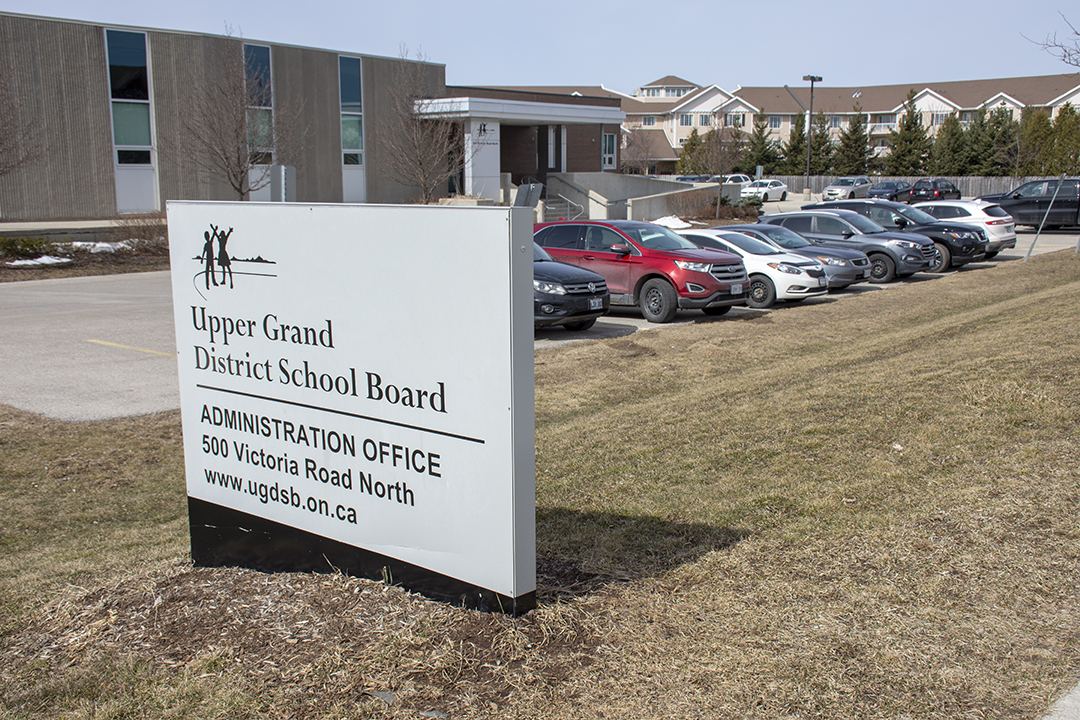GUELPH – Martha MacNeil heard from enough people with concerns that she asked trustees at the June 16 meeting of the Upper Grand District School Board to form a task force to look into police presence in schools.
Trustees will decide on June 23 to go forward with it or not, but in an interview on June 19, MacNeil said she has the sense that trustees are in favour.
“It’s not something we can ignore,” said MacNeil, who became chair of the board in December.
“If the community says they have an issue, we need to look into it.”
Policing, use of force, and racism is on people’s minds with Black Lives Matter protests taking place in cities and towns across the country.
MacNeil said she hasn’t heard any specific incidents at Upper Grand, but she’d rather be proactive than reactive.
“The goal would be to do a fair, balanced and neutral review; to look at programs and see what is working, what’s not, and what we can do better,” she said.
“I did contact police chiefs and detachment commanders to let them know what we’re doing.”
MacNeil said she was surprised to learn how integrated police are in school programs.
In primary grades, police talk to students about traffic safety and stranger danger, MacNeil said. In junior grades, they talk about internet safety, drug awareness, and they train student safety patrollers.
Police talk to intermediate students about cyber bullying, drugs and criminal activity, and in high schools there are often resource officers, who can help troubled students find services that will help them, such as Wyndham House or court services, for example.
“Police also support lockdown drills, the breakfast program, and some officers even coach our sports teams,” MacNeil said.
“Police are also heavily involved in the Special Olympics, which is a big deal in our board.”
Often, if there are situations in high schools with weapons or drugs or vandalism, the school will call the resource officer before the police department.
“They (resource officers) know the schools and often know the students. They tend to take a more gentle approach,” MacNeil said.
So it’s not an easy question or an easy answer when it comes to police in schools.
“It requires careful, methodical review,” she said.
Trustees are expected to establish how and who to approach to sit on the task force at the June 23 meeting.
The board’s three-year equity plan was also presented to trustees at the June 16 meeting. The report was to come to the board in March, but of course COVID-19 happened and the board didn’t meet until June.
“I felt it was urgent to get this on the table,” MacNeil said.
She explained equity at Upper Grand includes students, visitors, teachers and other board staff, in relation to race, gender, disability, LGBTQ and poverty.
“Everything we do is viewed through an equity lens,” MacNeil said.
“Right now, the focus is on anti-Black racism – the world is looking at that. But our plan is more than racism. There’s much more to it.”
Wellington Catholic District School Board
Wellington Catholic District School Board director of education Tamara Nugent said her board would also be developing its equity plan this fall.
“We have all been shaken by recent events and wondering how to accelerate work for change in our society, our school board and schools,” she said in an email.
“We acknowledge that not all interactions with police are positive, especially for members of the Black, Indigenous, and People of Colour communities.”
Wellington Catholic has community resources officer paired with the board’s schools.
“These officers are uniquely positioned to build trusting and authentic relationships with students,” Nugent said.
“These relationships form part of the many day-to-day activities in our schools and we have seen how they have built trust and openness for our youth when dealing with the police through specific program offerings.
“Their established relationships with our youth allow for better communication focused on resolution, restorative justice, reconciliation and pathways to supports.”
Nugent added the board would be engaging with the community this fall to gather input on the development of the board’s equity plan. She said the board will review and further develop this equity plan, which then will steer the actions the board will take in the 2020/21 school year and beyond
OPP
In an email, Derek Rogers, regional media relations coordinator with the OPP’s West Region, said the goal of police programs in schools is to build strong relationships with the community and positive interactions with youth.
“The OPP has a strong relationship with school boards,” Rogers stated.
“Our members are viewed as valued partners within the school community and provide education, prevention, and investigative support to teachers and students.”
He wrote that, “The goal of our presence in schools is to strengthen relationships by providing positive opportunities for interaction between young people and the police.
“We continue to communicate regularly with all school partners.”




